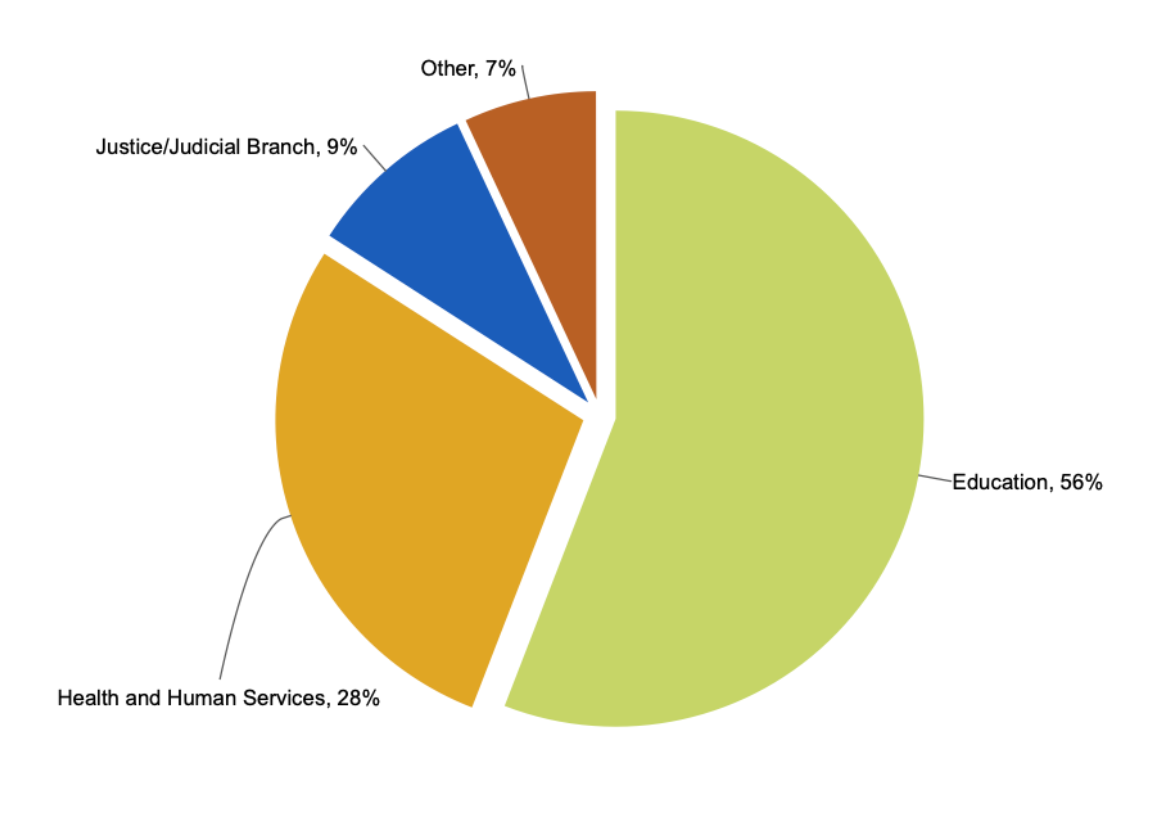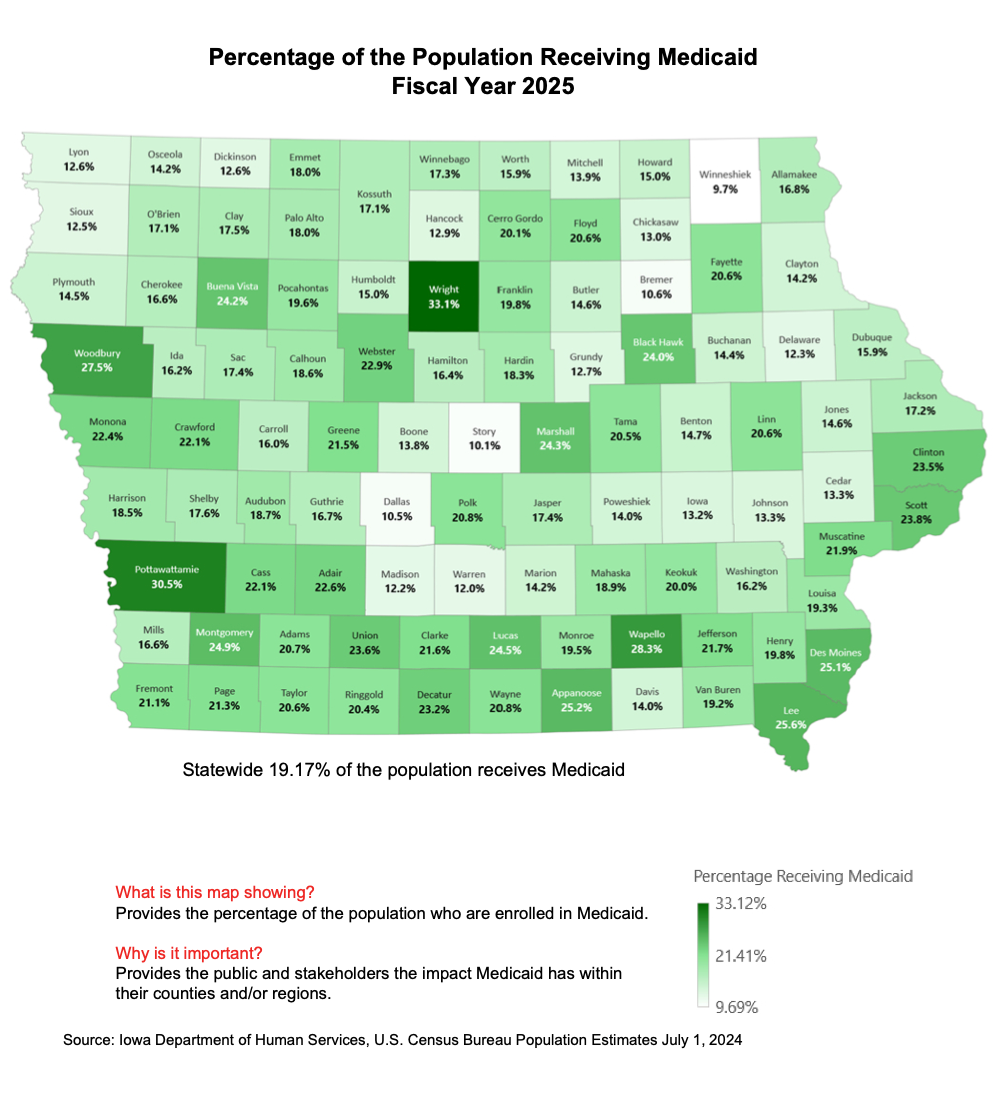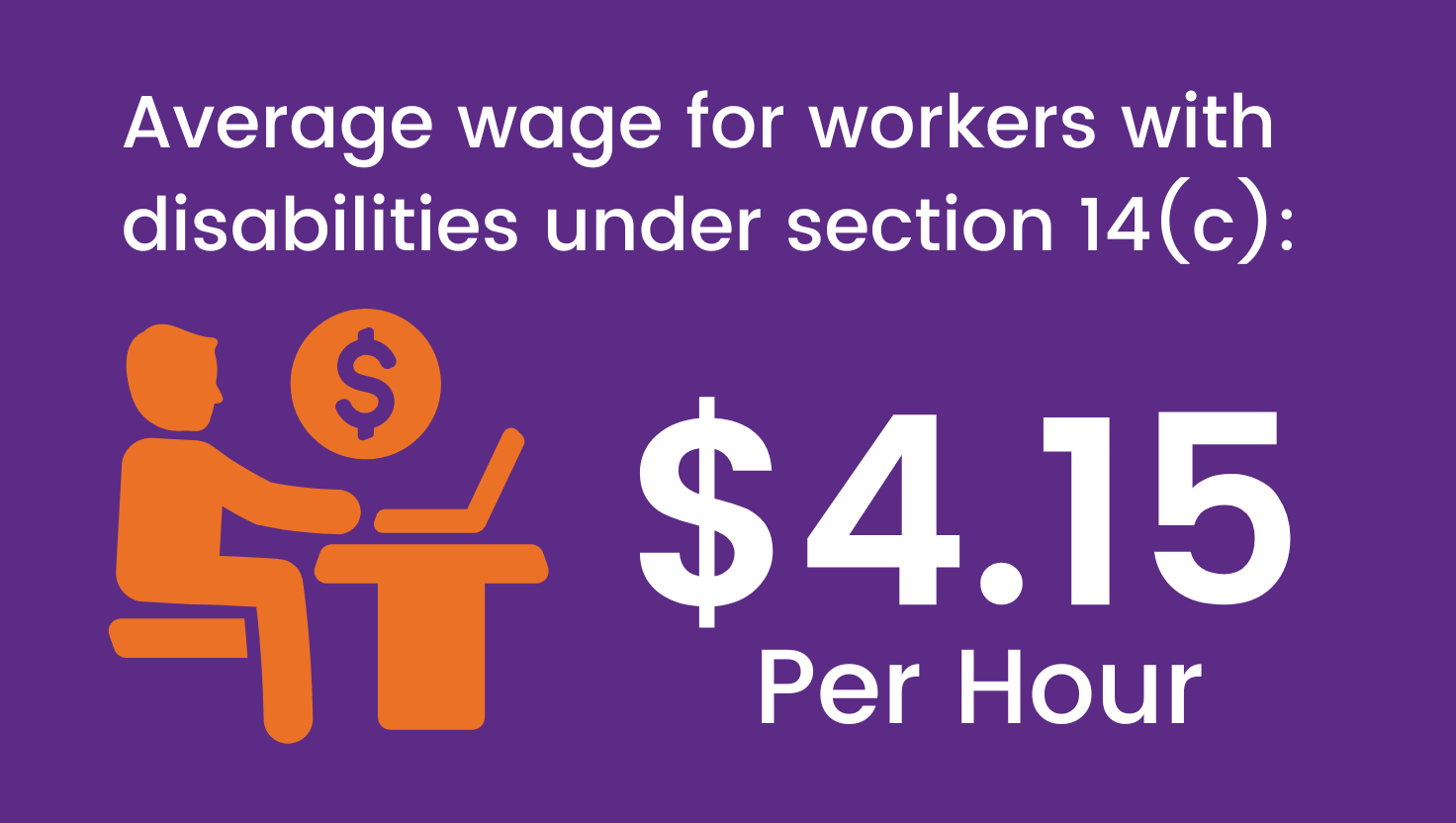infoNET NEWSLETTER
The infoNET Newsletter helps advocates with disabilities stay up to date on current issues in the Legislature, the governor’s office, and U.S. Congress. It also provides information on how to be a more effective advocate, how to connect with other advocates, and when there are opportunities to bring your issue to the attention of lawmakers and opinion leaders.
Current Newsletter PDF
Go to Newsletter Archives
Winter Issue | January 20, 2026
This newsletter is published quarterly. For more current information, check out our
weekly reports during the legislative session and
breaking news.
New Year Welcomes New Legislators
Iowa’s 150 elected legislators returned to the Iowa Capitol on Monday, January 12 to begin their 100-day legislative session. Iowa broke records in 2025 for the most special elections in a year:
- Sen. Mike Zimmer (D-Clinton) replaced Chris Cournoyer, who resigned in January 2025 to become Lt. Governor.
- Rep. Angel Ramirez (D-Linn) replaced Sami Scheetz in April 2025 after he became a Linn County Supervisor.
- Sen. Catelin Drey (D-Woodbury) replaced Rocky DeWitt, who died of cancer late summer 2025.
- Rep. Wendy Larson (R-Calhoun) replaced Mike Sexton (who is now working in the Trump Administration) in December.
- Sen. Renee Hardman (D-West Des Moines) won a late December special election to replace Claire Celsi, who died unexpectedly in the fall 2025.
Since the last session, the House and Senate also elected new leaders.
- Rep. Bobby Kaufmann (R-Cedar) became the new House Majority Leader, taking over for Rep. Matt Windschitl (R-Harrison). Rep. Windschitl is still a legislator, but he is now running for Congress in
Iowa’s 4th district.
- Rep. Brian Meyer (D-Polk) became the new House Minority Leader, taking over for Rep. Jennifer Konfrst (D-Polk). Rep. Konfrst also continues to serve as a legislator while running for Congress in
Iowa’s 3rd district.
- Sen. Mike Klimesh (R-Winneshiek) is now the Senate Majority Leader, taking over for Sen. Jack Whitver (R-Polk). Sen. Whitver is retiring after this year to focus on his health and recovery from brain cancer.
Along with these new legislators and leaders comes changes in committee memberships. Check out the updatedLegislative Guide to learn more about these new legislators, and view new committee assignments.
Legislative Leaders Lay Out Priorities for Year
As the Iowa Legislature reconvened for the 2026 session on January 12, 2026, legislative leaders used their opening-day speeches to stress cooperation and outline major priorities for the coming months, from property tax reform to public safety and landowner rights.
Speaking in the Senate chamber,
Senate President Amy Sinclair (R-Wayne) set a tone of civility and mutual respect.
“I encourage each of us to tone down our rhetoric and to get to work on what Iowans are telling us they really want,” she said, urging colleagues to avoid dehumanizing language in political debate. Sinclair noted a broader trend she sees in the political climate:
“When people disagree, it has become disagreeable… Calling people fascists, scum, deplorables, bigots… cannot be embraced as a status quo here.”
Senate Minority Leader Janice Weiner (D-Johnson) also appealed for empathy and unity, linking national concerns to state governance.
“We Iowans… stand up for the rights that are our rights too… let us resolve to carry out the people’s business with civility and empathy,” she said, referencing recent national events that have shaken communities. She also focused her comments on the cost of living,
“It’s time to listen to the working Iowans who power this state, who are telling us…that their core issue is affordability,”
she emphasized.
Senate Majority Leader Mike Klimesh (R-Winneshiek) previewed his agenda, including legislation to address property tax reform.
“Over the next 100 days we will be addressing property tax reform to help bring relief to Iowans who have decided to build their lives, grow their families, and dedicate their careers to our state,” Klimesh said. He also emphasized a need to address landowner rights when it comes to pipeline projects and bring down the cost of energy.
In the House,
Speaker of the House Pat Grassley (R-Grundy) highlighted key Republican priorities for the session, particularly public safety.
“This legislative session, career criminals will get the message: they are not welcome here in Iowa,” he said, outlining a “tough on crime agenda” with stricter measures for repeat violent offenders. Grassley also reiterated Republicans’ focus on property tax reform, saying Iowa’s system needs to
“put the taxpayers first.”
House Minority Leader Brian Meyer (D-Polk) hit on affordability in his message as well, saying "Iowa House Democrats will be committed to one clear goal this session: fighting for every Iowan who’s been left behind after nearly a decade of one-party control. Our agenda is rooted in what we hear every day from families across this state, and it comes down to three pillars: public education, affordability, and quality of life."
Across both chambers, leaders memorialized late colleagues and called on lawmakers to rise above partisanship in service to Iowans. As the session moves forward, we will see if their calls to work together across both political parties are put into action.
You can read and watch the opening day Senate and House speeches at:
Watch Senate speeches
here.
Read Senate speeches
here.
Watch House speeches
here.
Read House speeches
here.
Governor Reynolds Calls for Cancer Focus & Property Tax Reform
Every year, the Governor presents her top priorities to the Iowa Legislature during her
“Condition of the State” address. This year her focus is on helping veterans, slowing the growth of property taxes, improving rural health care, and addressing Iowa’s sky-high cancer rates. Some of her policy priorities include:
- No longer requiring counties to elect their County Auditor
(who controls elections),
County Recorder (who maintains official records and handles licensing), and
County Treasurer (who collects taxes and manages other fee-based services). Under the Governor’s proposal, the county board of supervisors could appoint these positions.
- Creating a $10 million grant fund to help local governments share services.
- Reconsidering a state-based health insurance exchange (where people are able to purchase Affordable Care Act subsidized insurance plans). Right now Iowans go through a national exchange; the creation of an Iowa-based exchange may make it easier for Iowans to find low-cost health insurance options.
- Requiring every person registering to vote to swear to they are a US citizen,
and increasing the penalty for lying about citizenship. The Governor also recommends requiring all state agencies to use the federal citizenship verification system (E-Verify) to make sure employees are legally able to work in the country.
The Governor’s budget puts additional money into Medicaid, but those funds are needed to meet current responsibilities. That means there is no money set aside for provider rate increases or to fully implement the HOME project (waiver redesign). In fact, the Governor is proposing
$52 million in Medicaid “cost containment.”
That usually means more hurdles for Medicaid members and providers to go through before receiving services and payment for the services. It often means fewer services, less hours of coverage, or lower pay. Watch @infonetiowa and @iowaddcouncil social media platforms and the
“Latest News”
section of the website.
Below you can see how much of our state's budget goes to education & health/human services.
Other budget recommendations include:
- Moving grants for
Centers for Independent Living Centers
and funding for independent living services from Iowa Workforce Development’s Vocational Rehabilitation Division to Iowa HHS’ Aging and Disability Services Division. The Entrepreneurs with Disabilities program remains with vocational rehabilitation.
- Moving funding for
Iowa ABLE
administration from Iowa HHS to the State Treasurer, where the program is managed.
- Increasing
school aid by 2%, including funding for private schools. This year parents of any income level can access the educational savings account program that allows them to use the funds that would have gone to their local public school to pay for private school tuition. The total going into these ESAs in the next year is expected to be $349.7 million, an increase of $20 million over last year and $132 million more than the year before that. No change in funding for
paraeducator salaries ($14 million) and
special education ($10 million).
- Cutting funding for
school-based mental health training by $1.5 million (leaving $1.9 million). The Governor stated this is “duplicative” funding.
- Eliminating funding for the
Iowa Epilepsy Foundation for their work to support people living with epilepsy ($144,000) and
child vision screening ($225,000).
You can find the Governor’s priorities and budget
here.
The independent Legislative Services Agency analysis of the Governor’s budget is now available
here.
Bills, Bills, and More Bills
Legislators filed 296 bills during their first week back to work at the State Capitol. The Iowa DD Council will be spotlighting some of these bills in their 2026 “Bills of the Week.” You can find those
here, along with talking points advocates can use when talking about these bills with their legislators.
Here are a few of the new bills introduced:
- House File 2033 (HF 2033) requires pharmacies give patients the option of receiving their medications with
accessible prescription labels, bag tags, and medical guides at no additional cost. The goal of this bill is to help people with disabilities and people with low vision be able to understand and use their medications safely.
- House File 2003 (HF 2003)
sets up a pilot program to allow one rural and one urban school district to set up a separate school for children with behavioral conditions and children eligible for
special education. This is a concerning bill, since the Individuals with Disabilities in Education Act (IDEA) requires students with disabilities to receive a “Free and Appropriation Public Education” (often referred to as “FAPE”) and that this be delivered in the least restrictive environment. This law makes sure that children with disabilities are served in an integrated setting, with their friends and neighbors without disabilities.
- House File 2012 (HF 2012)
makes students with disabilities attending
Comprehensive Transition & Post Secondary Programs (CTPs)
eligible for Iowa tuition grants. This change makes programs like REACH (University of Iowa), NEXT (Northwestern University), and EDUCATE (North Iowa Area Community College) more affordable.
- House File 2017 (HF 2017)
creates an
Iowa Work Opportunity Tax Credit to replace the one Congress let expire last year. This encourages businesses to hire individuals with disabilities and others who face challenges in finding jobs. There is already a subcommittee set up for this one on Tuesday, January 20 at Noon - and this is our first
Bill of the Week for 2026!
- House File 2033 (HF 2033)
requires pharmacies give patients the option of receiving their medications with
accessible prescription labels, bag tags, and medical guides at no additional cost. The goal of this bill is to help people with disabilities and people with low vision be able to understand and use their medications safely.
- House File 2068 (HF 2068) &
Senate File 2015 (SF 2015)
allows political parties to put the
location of caucuses
on their social media platforms, instead of publishing them in the newspaper. This means they could put this information out only on social media - and not in the newspaper or on their website. This could make it harder for Iowans to find where their local precinct caucus is held, particularly those that may not use social media.
- House File 2094 (HF 2094)
doubles the number of beds at the state’s
Mental Health Institutions and allows Medicaid funds to be used to pay for those services. Advocates say that more inpatient beds may be needed, but the real problem is the lack of subacute beds (a step-down level of care that helps people transition from an institutional setting to community living). Allowing Medicaid to pay for MHI beds would save the state a significant amount of money, but advocates say that those savings should be reinvested into HCBS provider rates and the development of subacute options, rather than investing in the most expensive level of care.
- Senate Study Bill 3005 (SSB 3005)
allows individuals with intellectual disabilities, autism spectrum disorder, or traumatic brain injury to meet unemployment assistance work search requirements by participating in approved
rehabilitative support programs
through the Division of Vocational Rehabilitation Services. This change is intended to make unemployment benefits more accessible to persons with disabilities by recognizing their unique employment support needs.
Check the
Iowa DD Council’s Bill Tracker daily for new bills introduced. You can download the list or view it
here. Status of these bills is updated automatically, so you always have the most current information.
Also remember to use the
Iowa DD Council Take Action Center
to send messages to your legislators and the Governor. You do not need to know who your legislators are, the system will find it using your address. Just put in your message and hit send - the system does the rest of the work for you!
Capitol Chat Schedule
Back by popular demand - we will be hosting
30-minute Capitol Chats every other week
during the legislative session. These shorter zoom meetings are free, provide quick updates on legislative progress, and will feature advocates and their work on various topics. It’s a great time to catch up, learn from other advocates, and ask legislative experts questions.
January 23 (Noon-12:30 pm)
February 6 (Noon-12:30 pm)
February 20 (Noon-12:30 pm)
March 6 (Noon-12:30 pm)
March 20 (Noon-12:30 pm)
April 3 (Noon-12:30 pm)
April 17 (Noon-12:30 pm)
Sign Up for Capitol Chats
Watch recorded Capitol Chats
here.
HOME Project Public Comment
Iowa HHS has been working on a project to update Iowa’s home and community based services (HCBS) waivers. Under the
Hope and Opportunity in Many Environments (HOME) project, Iowa HHS proposes replacing four of the current six disability based HCBS waivers— Health and Disability waiver, Children’s Mental Health waiver, AIDS/HIV waiver and Physical Disability waiver —with the Children and Youth waiver and Adults with Disabilities waiver.
Iowa HHS is redesigning its Medicaid home and community-based services (HCBS) waiver system to enhance services, support people to remain in their communities with their loved ones and make it easier for them to access the support they need. Iowa HHS has proposed two new age-based waivers:
- Children and Youth waiver. This waiver would provide Medicaid services for children and youth with disabilities, special health care needs, and mental health needs between the ages of 0 and 21. The waiver program could allow your child to live at home with family instead of in an institution like a hospital or nursing facility.
- Adults with Disabilities waiver. This waiver would provide Medicaid services for adults with disabilities aged 21 and older. The waiver program could allow you to live at home instead of an institution like a hospital or nursing facility.
Iowa HHS expects the cost of making this change will require an additional $2.4 million in state funding, but many expected this number to be much higher. Provider groups are worried that Iowa HHS will not pay full Medicaid rates for these services as a way to contain costs. Iowa HHS expects to begin implementing this in October of 2026.
Right now Iowa HHS is asking the public for their input on their plan - they will accept comments through February 13, 2026. Now is your time to let them know of any concerns you have, changes you’d like to see made, and thoughts on how this might help you.
- Find the answers to
frequently asked questions on this project
here.
- Read the
public notice
here and
submit comments
here.
Carlyn's Corner:
Let Us Work!
Carlyn Crowe is the Public Policy Manager at the Iowa DD Council.
News
By amy
•
December 16, 2025
Who Represents You? Guide Updated for 2026 Session
October 31, 2025
Government Shutdown Shuts Off Food Assistance (SNAP)
July 23, 2025
Trump Administration Will Continue to Allow Businesses to Pay People with Disabilities Less Than Minimum Wage
Show More








